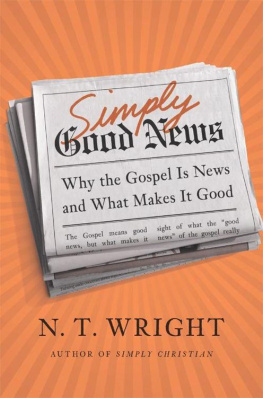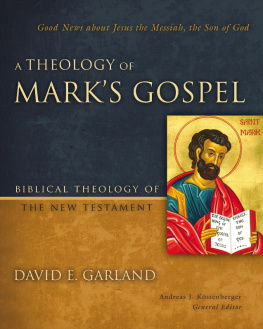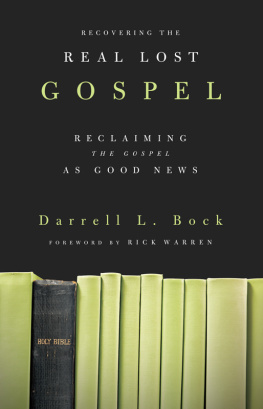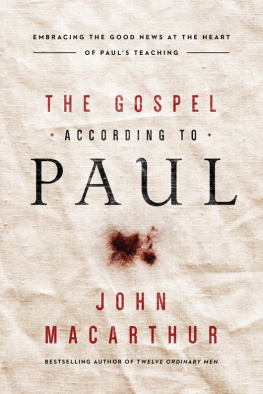
For
David and Karen Seemuth
and
Guy and Katie Thomas
CONTENTS

Y OU ARE SITTING quietly in a caf with a couple of friends when suddenly the door bursts open and in rushes a stranger with a wild, excited look on his face.
Good news! he shouts. Youll never guess! The greatest news you can imagine!
What on earth can he be talking about? What could his good news be, and why does he think it justifies barging into a caf and telling strangers about it?
Scenario 1: Perhaps the doctors just told him they had managed to cure his daughter of the disease that was killing her. That would be great news indeed, at least for his immediate family and friends, but it does not explain why he would announce it to strangers.
Scenario 2: Perhaps he heard that the local football team had won a great victory against their old rivals down the road. In some parts of my own country, people would indeed celebrate such a thing as good news, though most fans probably would have been at the pub watching the game with him. Why leave the celebration to tell the nonfans at the caf?
Scenario 3: Perhaps, in a region with high unemployment and poverty, he just learned that people had discovered huge new reserves of coal, oil, or gas. Suddenly there would be thousands of new jobs and a new start for everyone. I know places where that would cause otherwise quiet people to burst into a room and shout the news to everybody. That might justify such a dramatic announcement.
I start with these scenarios because I think we have lost touch with a basic element of the Christian faith. The Christian faith, in its earliest forms, is presented as good news. That is the original meaning of the Old English word gospel. I am arguing that the idea of seeing the Christian faith as news that is good is itself, ironically, news to many people today. Even those who know in theory that this is what gospel means often fail to appreciate the significance of the fact. We need, I suggest, to ask afresh: What is the good news that Jesus himself announced and told his followers to announce as well?
Most peopleincluding many Christiansnever ask themselves this question. We assume we understand the gospel because it seems so familiar and so entrenched. So we skip over the significance of why Christianity comes to us in the form of an announcement of the best possible news. The word gospel now carries different meanings. We talk of gospel truth when we want to stress how reliable something is. In some churches, preaching the gospel means explaining how to become a Christiana formula we use to make sure we arrive in heaven safe and sound. For others, gospel is simply a type of musicthough, granted, gospel music does often give the impression that something exciting is happening.
But when Jesus and the early Christians spoke of good newswhich they did a great dealthey meant much more than this. They really did see it as news, and they believed this news was so good that it was worth announcing as widely as possible. Many churches and many Christian preachers and teachers manage to ignore this. Usually people outside the Christian faith dont realize that this is what Christianity is supposed to be about.
Lets go back to the stranger in the caf. Each of the options I suggested has a particular shape that helps us understand more deeply what is meant by good news.
First, the news in each case isnt just something that has happened out of the blue. Each one of the announcements I mentioned assumes a larger context, as if it were a new and unexpected development within a much longer story. In the first case, the announcement comes amid the story of a sick and dying child. In the second, the longer running story is that of the well-known sporting rivalry between the teams. In the third case, the announcement comes in the context of the slow, sickening decline of a whole region into social deprivation. The news in question makes sense within that longer story. Only by knowing this backstory can we understand why the new announcement is good news.
Second, this news is about something that has happened, because of which everything will now be different. This news has significance; it makes an impactit has consequences that alter lives. When you put good news within the longer story, it isnt just a matter of well, that was nice, but now we go back to how things were before. (In the case of the football victory, it might feel like that after a few weeks, but at the time it always registers as a new beginning.) The child is going to get better! The whole region is going to recover! Life has been transformed!
Third, the news introduces an intermediate period of waiting. The child is still in the hospitalbut instead of waiting anxiously and sorrowfully, we are now waiting with excitement and joy for her to get better and come home. Half the workforce is still unemployed, but now they will lift their aspirations and look forward to healthy activity and the resulting prosperity.
What good news regularly does, then, is to put a new event into an old story, point to a wonderful future hitherto out of reach, and so introduce a new period in which, instead of living a hopeless life, people are now waiting with excitement for what they know is on the way.
The Christian good news is supposed to be this kind of thing. The gospel of Jesus Christ comes as news within a larger story. It points to a wonderful new future. And it introduces a new period of waiting that changes our expectations. I am writing this book because I think many people, inside the church as well as outside, have seldom heard the gospel story told in this fashion. As a result, all sorts of things get muddled.
Good Advice, Wrong News
In many churches, the good news has subtly changed into good advice: Heres how to live, they say. Heres how to pray. Here are techniques for helping you become a better Christian, a better person, a better wife or husband. And in particular, heres how to make sure youre on the right track for what happens after death. Take this advice: say this prayer and youll be saved. You wont go to hell; youll go to heaven. Heres how to do it.
This is advice, not news.
The whole point of advice is to make you do something to get a desired result. Now, theres nothing wrong with good advice. We all need it. But it isnt the same thing as news. News is an announcement that something significant has happened. And good news is what Jesus and his first followers were all about.
At this point someone will object, My church hasnt forgotten the good news! We know that Jesus died for our sins! He took our punishment so that we could go to heaven! Isnt that good news? If you thought you were destined for hell and suddenly someone told you God had done something about it, wouldnt that be good news?
Well, yes, it would. Butand this is the shocking and difficult thing for many peoplethat isnt exactly the good news Jesus and the early church were talking about.
In other words, while some Christian teachers have exchanged good news for good advice, others have preserved the gospel as news, but they are telling a different story from what the New Testament authors meant by good news.
Yes, the good news is indeed about Jesus, and about his death and resurrection in particular. Yes, this good news does indeed open up a vision of an ultimate future beyond death, so that we live in hope and joy meanwhile. But the usual heaven-and-hell scheme, however popular, distorts the Bibles good news. Over many centuries, Western churches have got the story wrong. They have forgotten what the backstory is (the larger story that gives meaning and context to the good news). As a result, the news that bursts in upon it means something significantly different, and the long-range vista opened up by this news means something different again.
Next page















